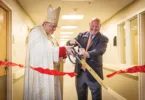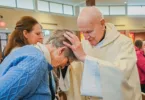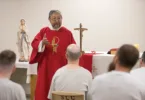Opposition to new embryonic stem-cell guidelines is ignored
by Joe Bollig
joe.bollig@theleaven.org
KANSAS CITY, Kan. — The federal government’s new embryonic stem-cell research guidelines have been called an “ethical farce” that ignores key ethical issues and widespread opposition.
On July 7, the National Institutes of Health published its final guidelines for scientists who wish to receive federal funding for human embryonic stem-cell research (HESCR).
“Those who are opposed to this form of research at its most foundational level, because of the ethics, are not given any serious consideration,” Father Tadeusz Pacholczyk, a scientist and director of education at the National Catholic Bioethics Center in Philadelphia.
Catholic News Service reported that, during the public comment period in April and May, 30,000 of the approximately 49,000 who commented opposed this research.
These comments were “deemed not responsive to the question put forth,” according to Dr. Raymard S. Kingston, acting NIH director, when interviewed by CNS. “We did not ask them whether to fund such funding, but how it should be funded.”
“The approach here was, ‘We’re going to go ahead and do this, how do you think we should do it?’” said Father Pacholczyk, “not, ‘Is it right or wrong for us to do this?’ . . . even though the majority of the comments they received dealt with the basic moral issue — that this involves the government in the destruction of young humans.”
The NIH claims the guidelines “ensure that the NIH-funded research in this area is ethically responsi- ble.” But Father Pacholczyk said they actually ignore the central ethical issue, which is the killing of human beings at their earliest stages of life for medical research.
“[They say], ‘We’re going to destroy these embryos, we’re going to end human lives, but don’t worry, we’ll assign all the proper paper- work as we do it and get informed consent from the parents before we destroy their children,’” said Father Pacholczyk. “So, it’s a farce, ethically speaking, at play here.”
“I would say the ethical issues are not addressed [by the NIH guidelines],” he continued. “I would say there was a certain amount of procedural maneuvering that is encouraged by these guidelines to provide a sort of ethical cover, but not any kind of solid ethics built on principle — except perhaps for the principle of expediency.”
Although the NIH guidelines explicitly prohibit funding for the destruction of human embryos, they implicitly provide a tremendous incentive for this to occur, said John Morris, a member of Holy Cross Parish in Overland Park, and a professor of philosophy at Rockhurst University in Kansas City, Mo. Morris is a special adviser on stem-cell research to Bishop Robert J. Finn of the Diocese of Kansas City-St. Joseph, Mo.
“I think in the minds of most Americans this is a package deal,” said Morris. “You’re destroying the embryos, and that’s wrong, so anything that comes from that should not be paid for by our tax dollars.”
One of the glaring flaws of the guidelines is that they ignore the basic ethical issue, said Morris.
“They ignore the central ethical issue: the destruction of embryos,” said Morris. “The guidelines try not to focus on that, but they say once you get the stem cells, we want to fund the research.”
Morris finds some of the language in the guidelines misleading and disingenuous. The guidelines stress that human embryonic stem cells are not human embryos, but ignore the unavoidable fact that human embryonic stem cells can only come from human beings who have been killed during the embryonic stage of their development.
“It’s hairsplitting at its finest,” said Morris.
The purpose of this semantic ballet seems to be an attempt to deal with a piece of legislation called the Dickey Amendment, which prohibits funding for research involving destruction of human embryos.
Guidelines under the Bush administration allowed funding for research with existing human embryonic stem-cell lines, which was allowable under this amendment, said Morris. The new NIH guidelines, however, present an attempt to reinterpret this legislation to allow research on new human embryonic stem-cell lines.
“I’m suspicious that this is just a small first step that opens up the door to more,” said Morris. “Researchers are going to say, and they already say, ‘We don’t have enough embryos for research; we need more,’ so they’re going to be allowed to use these so-called ‘left-over’ embryos [from fertility clinics].”
“Still, these represent a pretty small amount,” he continued. “They’ll say, ‘Now that you’ve allowed this, you got to allow more,’ and there will be continual pressure, and that will mean embryos cloned for research.”
The guidelines as written now do not allow funding for research on human embryonic stem cells produced for research, or by cloning, but the guidelines could easily be rewritten to allow these, he said. The Obama administration has already laid the groundwork by claiming a distinction between so-called “reproductive” and “therapeutic” cloning.
“There has been a very significant shift in the posture of the federal government toward the important issues of human life,” said Father Pacholczyk. “And it has been a radical change of position, and one that does not bode well for the protection of the weakest and the most vulnerable among us. People of good will have to speak out on these issues.”
Much can be done, he suggested. People can speak out by writing letters to the editor of local newspapers and contact members of Congress. People can educate themselves, and talk among themselves about what can be done.
“Once we properly frame the question, and people recognize the discussion about human embryos is [a] discussion about brothers and sisters to each one of us, then it will be possible to enact laws that are just and elect officials who will properly protect all of us,” said Father Pacholczyk.






